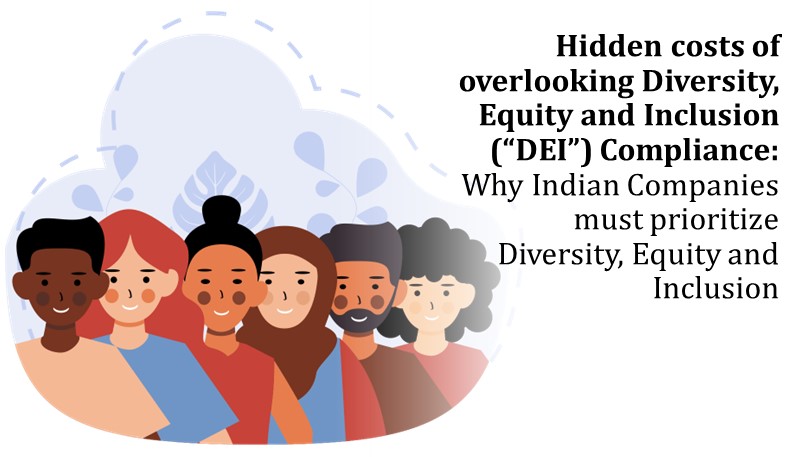Hidden costs of overlooking Diversity, Equity and Inclusion (“DEI”) Compliance: Why Indian Companies must prioritize Diversity, Equity and Inclusion

Diversity, equality, and inclusion (“DEI”) is an organizational structure designed to promote fairness in treatment, equal compensation, opportunity, and inclusiveness for a wide range of employees with distinct identities in the workplace. Diversity, equity, and inclusion are often put together because they are interconnected, and the benefit is only seen when they are combined. These are the words used to express three ideals that most organizations try to reflect in order to better meet the requirements of employees. Indian laws and regulations impose some compliance management system on employers for ensuring diversity, equality and safe working environment for their employees.
This blog attempts to succinctly cover such DEI compliance obligations emanating under Indian legislations along with penal ramifications for non-compliance.
Obligation to prevent gender discrimination at workplace
Employers are required to:
-
pay equal remuneration to men and women for the same or similar work;
-
prevent gender discrimination during recruitment;
-
gender discrimination in any condition of service post-recruitment, such as promotion, transfer, or training.
Non-compliance may lead to fine up to: Rs 20,000/- or imprisonment for up to one (1) year.
Transgender (Protection of Rights) Act, 2019:
Employers need to:
-
provide a safe working environment and ensure equal treatment of transgender persons in matters relating to employment, promotion, infrastructure adjustments, employment benefits, etc.
-
provide facilities which enable transgenders to effectively discharge their duties in the establishment, including making provision for unisex toilets, transportation, amenities such as hygiene products, etc.
-
designate a Complaints Officer for dealing with complaints relating to any violations under the provisions of the Act.
-
formulate an Equal Opportunity Policy for transgender persons and display the same preferably on the company website or any conspicuous place in the premise.
Non-compliance of the above-mentioned obligation may lead to imprisonment for term extending up to two (2) years along with fine.
Public companies with turnover of Rs. 300 crore or more, or paid-up share capital of Rs. 100 crore rupees or more are required to ensure that the Board includes at least one woman director.
Non-compliance of the above-mentioned obligation may lead to a fine of Rs.50,000/-.
Obligation to prevent discrimination against employees with physical ailments or disabilities
-
Adopting and implementing an HIV and AIDS policy to prevent discrimination against any protected person.
-
Maintaining confidentiality of HIV related information as per the Data Sharing Guidelines issued by National Aids Control Organisation.
-
Organizing workshops and programmes for sensitizing employees with the provisions of the HIV Act.
-
Prohibition on compelling a person to disclose his own or another’s HIV status or related information.
Non-compliance of obligations may lead to fine extending to Rs. 1,00,000/- and imprisonment extending to two (2) years.
Rights Of Persons with Disabilities Act, 2016:
-
Employers are required to formulate and notify an Equal Opportunity Policy for persons with disabilities) mentioning facilities and amenities to be provided to them for effectively discharge their duties and display the same on the company website / conspicuous places in the premises.
-
Duty to occupy buildings which fulfill the standards of accessibility relating to physical copies.
Penalty for non-compliance may lead to a fine extending to Rs. 10,000/- and a subsequent fine of Rs. 50,000/- extending to Rs. 5,00,000/-.
Obligation to provide safe working environment for women employees
Sexual Harassment of Women At Workplace (Prevention, Prohibition and Redressal) Act, 2013:
-
Preparing a policy for prevention of sexual harassment- such policy shall prohibit unwelcome behaviour that constitutes workplace sexual harassment, conducting orientation, awareness and sensitization sessions and having in place a detailed framework for redressal process.
-
Constituting an Internal Committee for each workplace for deciding upon complaints filed by aggrieved women employees in relation to incidents ofsexual harassment.
-
Displaying of a notice informing employees about the constituted Internal Committee and penal consequences of engaging in acts constituting sexual harassment.
-
Conduct workshops and awareness programmes for sensitising employees with the provisions of the Sexual Harassment of Women at Workplace (Prevention, Prohibition and Redressal) Act, 2013.
The Act prescribes a fine of Rs 50,000/- for non-compliance.
Conclusion
It is mandatory for organizations to conform to DEI obligations under Indian legislations to evade extortionate fines and ensure fair treatment, equal opportunities, and inclusiveness for employees. Lexplosion has supported companies across various industries in monitoring their compliance through our compliance management software Komrisk. For more information on completion of a compliance circle reach out to us at inquiries@lexplosion.in.
Written by: Nishtha Chakrabarti
Co-authored by: Abhishek Roy
Disclaimer
This content is intended for informational purposes only and does not constitute a legal opinion. Despite our efforts to maintain accuracy, we do not make representations, warranties or undertakings regarding the quality, completeness or reliability of the content. Readers are encouraged to seek legal counsel prior to acting upon any of the information provided herein. This content, including the design, text, graphics, their selection and arrangement, is Copyright 2024, Lexplosion Solutions Private Limited or its licensors. ALL RIGHTS RESERVED, and all moral rights are asserted and reserved.
For any clarifications, please reach out to us at 91-33-40618083 or inquiries@lexplosion.in. Refer to our privacy policy by clicking here.